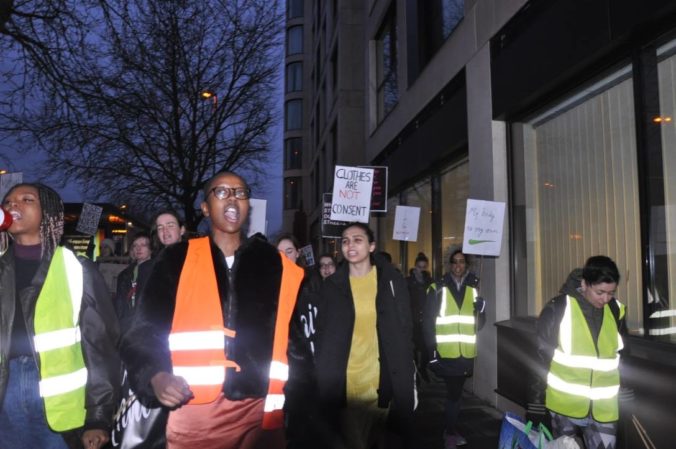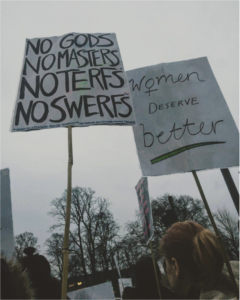A CALL TO ACTION
ASSEMBLE ON PARKER’S PIECE AT 5:30PM ON THE 11TH MARCH.
“We march to reclaim our bodies, space and to put an end to sexual violence.” The Reclaim the Night March has a long history in Cambridge and this year, it falls at a particularly interesting time with discussions about sexual violence have entered the mainstream. All women and non-binary people are welcome to attend, no matter whether they have been involved in feminist organizing or not.
We welcome all community groups to march alongside us – the march will be divided into blocs, with disabled students setting the pace.
Below are the experiences of women and non-binary people who have attended the Reclaim the Night March and the vigil that happens after:
Lola Olufemi, CUSU Women’s Officer
I put the date of the first reclaim the night down in my diary immediately when it was announced. I remember actively seeking out the women’s campaign before I arrived at university because I was interested in feminism. I owe so much to the space for teaching me what a truly liberated future might look like and how it was ours for the taking. Marching through the Cambridge with other women and non-binary people screaming at the top of my lungs made me feel powerful. It made me realize that a future without sexual violence is possible. It is not a dream.
Claire Smith, Women’s Campaign Zine Officer
Reclaim the Night has been one of my favourite and most important experiences at this university. I came to my first march with two people from my college and a banner made on my floor the night before using a toothbrush and navy acrylic paint. The march and the vigil afterwards gave me the tools to ask for what I needed after a really difficult time in early 2016. I felt unqualified to sign up for a stewarding slot in my second year (because of imposter syndrome destroying my brain) but I signed up anyway and the rush I had from screaming down the streets was unbeatable. I love the women’s campaign and I love marching with women and non-binary people who are really fucking angry. Reclaim the Night, and the women’s campaign in general, reminds me that anger is valid and necessary, that change comes through disruption, and that hearing the voices of women and non-binary people in the streets at night is an incredibly life-affirming feminist action.
Waithera Sebatindira, Women’s Officer 2016-17
I love the power of Reclaim the Night marches, but my favourite moments have been the vigils that follow the march. The room booked yearly in the University Centre, usually used for conferences and meetings, becomes a space for radical softness. Women and non-binary people open up about painful experiences in ways that aren’t possible in our day-to-day lives. They do so as a method of healing, not just themselves but others. I’ve gotten the impression that it’s also a space for anger. An anger that is empathised with by everyone in the room and can exist without policing. It’s a truly transformative space and, not to be dramatic, I wouldn’t be the person I am today without it.
Siyang Wei
I went to Reclaim the Night in my first year, and I think it was the first political march I ever attended. I didn’t really go with anyone, and initially I felt self-conscious and out of my depth. But I was surrounded by so many other women and non-binary people, chanting and shouting and making a space of affirming feminist anger that energised me too. We are taught so much to watch ourselves, to watch others looking at ourselves. It was the abandon of the march –the letting loose of ugly or painful things into a moment of empathy and resistant community – that made it for me so powerful and transformative.
Anna Pick
Reclaim the Night reminds us of the visceral power of feminist organizing. By marching – taking up space – we show that sexist oppression does not exist in the abstract, but in the direct, lived experience of inhabiting a gendered body. In almost every country in the world, smartphone data shows that women walk significantly fewer steps than men day-to-day. This comes as no surprise to me, or to the majority of the women and non-binary people I know, for whom the anxiety – even terror – of walking alone at night, of being followed or harassed, has become second nature.
Reclaiming space is a vital practice. It shows that identity politics cannot be reduced to a lack of resilience, to the ‘snowflake generation’ – what is at stake here is our survival, our dignity, our humanity. This is why feminist spaces prioritise lived experience, and why it is so vital to attend to the ways in which sexism intersects with race, class, sexuality, ability and other categories of oppression.
At Women’s Campaign events this year there has been a lot of discussion about institutional memory. How do we ensure that the work done by activist students today is taken up by others when they leave? Part of the answer seems to be that each generation of students needs to develop its own language to speak to these issues, its own tools and strategies to address them. Reclaim the Night is an opportunity to draw inspiration from those who have come before, whilst also owning the space for ourselves, adding a unique voice at a unique moment in the long struggle against gendered violence.
At the risk of turning this into a weekly essay, the word ‘reclaim’ is from the Latin word meaning to ‘cry out against’. Reclaim the Night is about solidarity, but it is also an expression of anger. On 11th March we will gather strength from each other, and use the privilege of safety in numbers, to shout back at the world and its injustices.
Amy Clark
One of the first marches I ever attended (at least at Cambridge) was Reclaim the Night, and I wasn’t sure what to expect. What I found was a joyful, cathartic, and collective display of solidarity and anger. We marched through the streets of Cambridge holding placards that spoke against transmisogyny, sex-worker exclusionary feminism, and sexual violence. I remember listening to the speeches on Parker’s Piece, standing together against the violence that is directed against women and non-binary people across the world. One of the parts I remember most vividly is collecting together afterwards to read poetry – hearing so many people stand up and tell their story during the evening was beautiful.
Jun Pang
you look and expect soft edges –
a kind smile – silence. you reduce
me, think that because I have small eyes
I cannot see, that because I have pursed lips
I cannot speak, that because I am myself
I am an open door, like the cherry
blossoms blushing pink in springtime –
or something along those tired lines.
I scream and you are scared for my safety
pins and needles prickling your skin from
the sheer magnitude of the noise. My lungs
expand and I am shrinking no more, reclaiming
the top of my lungs without you, against you.)
Love and solidarity, we hope to see you there.
The CUSU Women’s Campaign
xx


